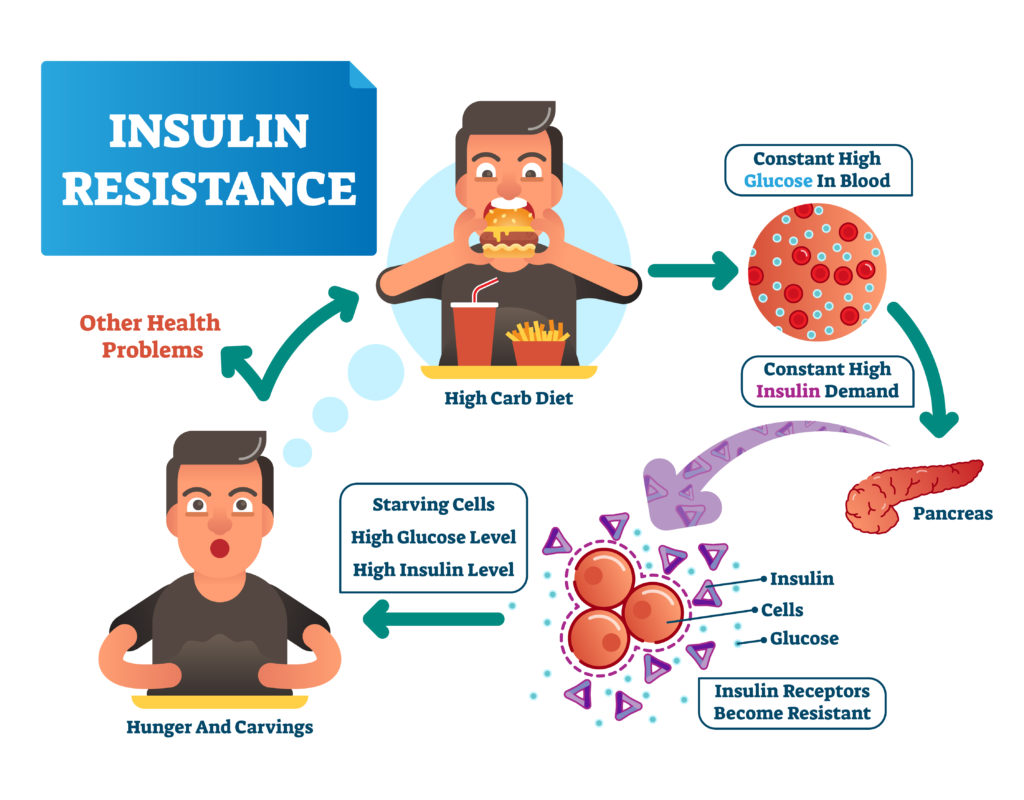 What is Insulin Resistance and Should You be Concerned About it?
What is Insulin Resistance and Should You be Concerned About it?
Insulin Resistance doesn’t have any symptoms so people don’t always know that they have it. Because it affects both the endocrine system and the cardiovascular system, Insulin Resistance can be particularly dangerous if it’s not addressed. It’s a precursor for Type 2 Diabetes as well as Cardiovascular Disease.
Insulin is a hormone that’s made by the pancreas. The pancreas is a large gland located behind the stomach and one of its functions is to produce insulin. This normally happens after we eat and blood sugar (glucose) levels to spike. Glucose comes from the food that we eat. Insulin acts as a key for the glucose to enter the doors of the cells in muscles, the liver, fat, and other organs where it is used for energy. Once this happens, blood sugar levels in the blood are regulated back into a normal range.
The liver is also capable of making small amounts of insulin as needed, such as during periods between meals or when fasting.
Insulin Resistance is a condition that occurs over time. It happens when the cells in the body become “resistant” to insulin. As a result, glucose is unable to enter the cells effectively and blood sugar levels stay high in the bloodstream. The pancreas goes into overdrive and produces more and more insulin in order to move the glucose out of the bloodstream and into the cells where it’s needed.
When someone is Insulin Resistant, insulin levels rise in the bloodstream and can be up to 5 to 7 times higher than they should be. This has adverse effects on the metabolism, inhibiting the body’s ability to break down fats.
Insulin Resistance usually occurs in people who are obese, but it also occurs in people whose weight is in the normal range, depending on their diet and lifestyle. The common denominator is that fat accumulation is concentrated around the abdomen.
A Vicious Cycle
Insulin Resistance creates a vicious cycle and if not managed correctly, can quickly spiral into more serious problems. The cells that need glucose become starved of energy while glucose in the bloodstream stays elevated because there’s no place for it to go. Higher insulin levels signal the body to store fat, especially around the abdominal area. This fat (also called visceral fat) is especially dangerous because it causes the liver and other organs to become fatty and inflamed.
Visceral fat also causes Insulin Resistance, so it becomes a “chicken and the egg” situation since Insulin Resistance also causes this belly fat to accumulate.
Causes of Insulin Resistance
Many things contribute to Insulin Resistance. One of the biggest causes is increased amounts of fatty acids (also called triglycerides) in the bloodstream. Triglycerides are a form of cholesterol. Several studies have shown that these fats impede insulin from getting into the cells. The biggest reason for elevated triglycerides is eating the wrong types of foods. Genetics can cause a predisposition to abnormal cholesterol, but it is mainly affected by diet choices.

Not everyone who has Insulin Resistance is overweight. What makes a person more likely to be afflicted is where they carry their weight. If it’s around the abdominal area, chances are that they will be Insulin Resistant. For tips on how to specifically reduce belly fat, click here.
Other causes of Insulin Resistance include:
- Obesity
- Eating a diet high in sugar and processed foods
- Physical Inactivity
- Inflammation
- Imbalances in the gut microbiome
- Poor sleep habits
- Sleep apnea
- Genetics
While you can’t change your genetic disposition, you do have the ability to make yourself healthier by the foods that you eat and by the lifestyle that you choose.
Complications of Insulin Resistance
Insulin Resistance can lead to Metabolic Syndrome, also called Syndrome X. This occurs when a person has the following four conditions:
- High blood pressure
- Elevated glucose levels (blood sugar)
- Abnormal cholesterol/triglyceride levels
- Excess abdominal fat (waist size greater than 35 inches in women or 40 inches in men)
Metabolic Syndrome significantly increases the risk for Cardiovascular Disease, Stroke, and Diabetes.
Insulin resistance often leads to Pre-Diabetes and/or Diabetes. The reason for this is because over time, the ability of the pancreas to produce insulin decreases. When this occurs, blood sugar can no longer be managed naturally by the body and require medication to regulate it. Blood sugar levels are considered Pre-Diabetic if measured between 100 and 124. If they exceed 125, a person is considered to be a Diabetic.
Diabetes carries serious health risks including:
- Kidney disease
- Increased risk of Heart Attack and Stroke
- Nerve damage
- Impaired circulation
- Weakened immune system
- Added inflammation
- Death
Chronically elevated levels of Insulin also trigger increased cell and tissue growth. Not only does this contribute to more weight gain, but it also poses an increased risk of cancer.
How Is Insulin Resistance Treated?
There’s no magic pill to treat Insulin Resistance, but the good news is that it’s completely reversible. Treatment consists of a multi-faceted approach which includes:
- Lose weight
- Exercise – Not only will exercise help you to lose weight, but it also causes muscles to be more insulin sensitive which also decreases Insulin Resistance
- Avoid sugary foods including alcohol
- Avoid processed foods
- Increase consumption of good fats and proteins
- Increase consumption of whole foods to include plenty of vegetables, fruits, legumes, nuts, and seeds
- Adopt healthier sleeping habits
- Incorporate practices into your life that bring balance to mind, body, and spirit
Additionally, we recommend supplementing your diet with what we refer to as the “Pillars of Health”:
- A good multivitamin
- Vitamin D3
- Fish oil
- Probiotics
- Magnesium
Other supplements that can help with Insulin Resistance include Chromium and Berberine.
Renewed Vitality Providers Can Help!
Our providers at Renewed Vitality of Dallas have extensive backgrounds in Endocrinology, Hormones, and Nutrition. Our comprehensive lab work includes Insulin testing which is something that most physicians don’t normally check. We also look at inflammation markers and other underlying issues.
It is also quite common that when one or more hormones are imbalanced, other hormones are affected to. We offer our expertise in hormone balancing and can provide you with education on how to best overcome Insulin Resistance.
Free Phone Consultation with our New Patient Coordinator
Renewed Vitality is a place of hope. Our knowledgeable providers are experts in their field and take the time to find the underlying causes of hormonal imbalances and illness. We will work with you using proven, scientific-based technology, in a warm and compassionate environment, to help you restore your health so that you can live a life of vitality and wellness.
Please contact our New Patient Coordinator for your Free Phone Consultation. She can answer any questions or concerns that you may have and give you additional information about our providers, our protocols and fees, what is covered by insurance and what is not, and any other details you may need. She can also get you booked for your first appointments, if you decide we are a good fit for you. There are no obligations to book an appointment.
Please call 214-740-4703 to learn more, or complete the form below, and we will contact you. We would love to hear from you!
